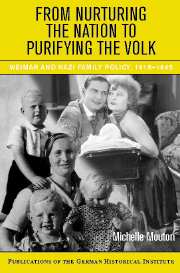Book contents
- Frontmatter
- Contents
- Acknowledgments
- List of Abbreviations
- Introduction
- 1 Marriage Policy in Turmoil
- 2 Divorce
- 3 From Mother's Day to Forced Sterilization
- 4 Alleviating the Burdens of Motherhood
- 5 Maternal Morality versus Infant Mortality
- 6 Forming Families beyond Blood Ties
- 7 Conclusion
- Bibliography
- Index
3 - From Mother's Day to Forced Sterilization
Promoting Motherhood as the Solution to the Population Crisis
Published online by Cambridge University Press: 05 January 2013
- Frontmatter
- Contents
- Acknowledgments
- List of Abbreviations
- Introduction
- 1 Marriage Policy in Turmoil
- 2 Divorce
- 3 From Mother's Day to Forced Sterilization
- 4 Alleviating the Burdens of Motherhood
- 5 Maternal Morality versus Infant Mortality
- 6 Forming Families beyond Blood Ties
- 7 Conclusion
- Bibliography
- Index
Summary
Maternity … no longer oppresses and burdens the individual woman but becomes the concern of the public at large.
– Adele Schreiber, SPD delegate, 1924The future of the Volk is only secure when it is prepared to give the highest sacrifice for mother and child.
– Government propaganda campaign, 1935During both the Weimar and Nazi eras, politicians across the political spectrum, clergy, feminists, and doctors were united in the belief that the promotion of motherhood was necessary to boost the birthrate and improve national health. Perceiving women's resistance to motherhood as central to the nation's problems, many Germans advocated rallying women to resume their duties as mothers, while others argued that Germany's health depended on controlling who became a mother. Profound differences in how politicians on the Right and Left envisioned motherhood – and hence how to rehabilitate it – opened debates on Malthusianism and neo-Malthusianism, racial hygiene, pronatalism, and even sterilization.
Celebrating and honoring mothers presented itself to Weimar politicians as a way to unite the divided nation and strengthen the population. With the strong support of the churches, state officials increasingly recognized mothers' crucial contribution to society. Yet as they weighed welfare and pronatalism against the implications of sexual equality as enshrined in the Constitution, they found that no consensus existed about how to celebrate mothers. They disagreed about whether mothers should be publicly or privately honored and whether all or just some mothers deserved recognition.
- Type
- Chapter
- Information
- From Nurturing the Nation to Purifying the VolkWeimar and Nazi Family Policy, 1918–1945, pp. 107 - 152Publisher: Cambridge University PressPrint publication year: 2007



